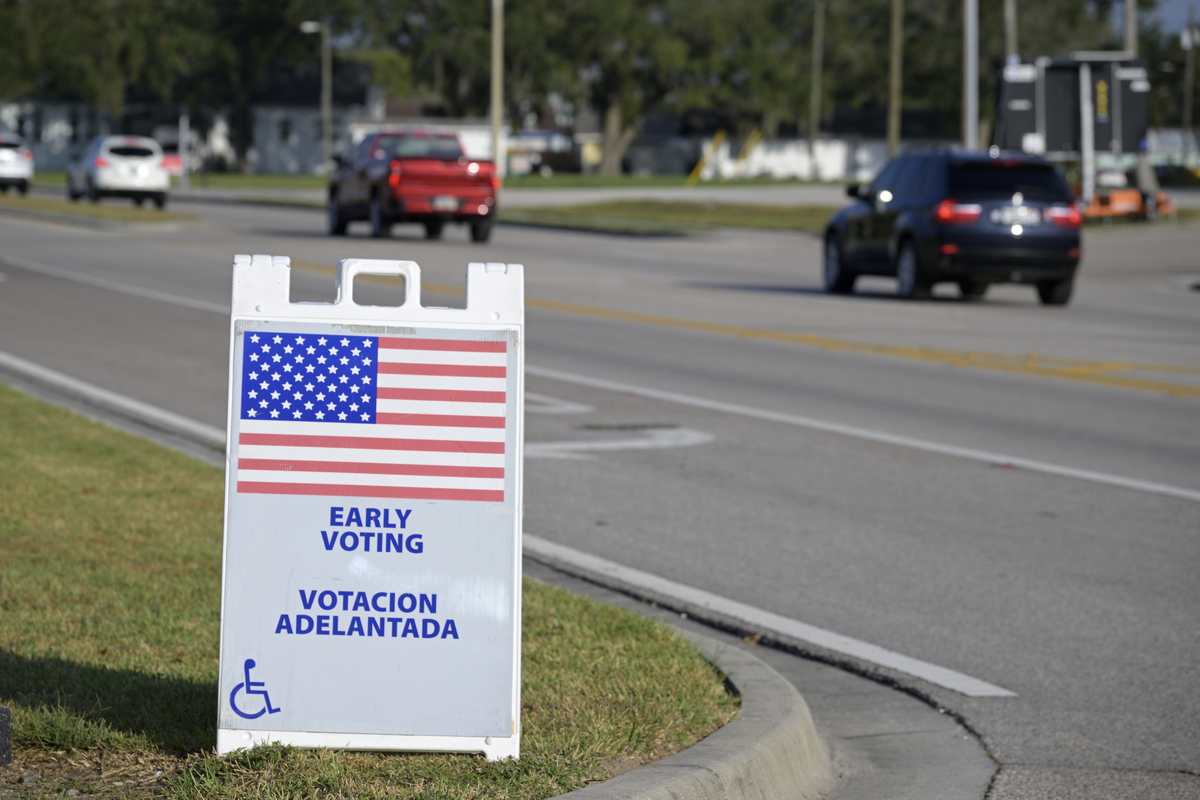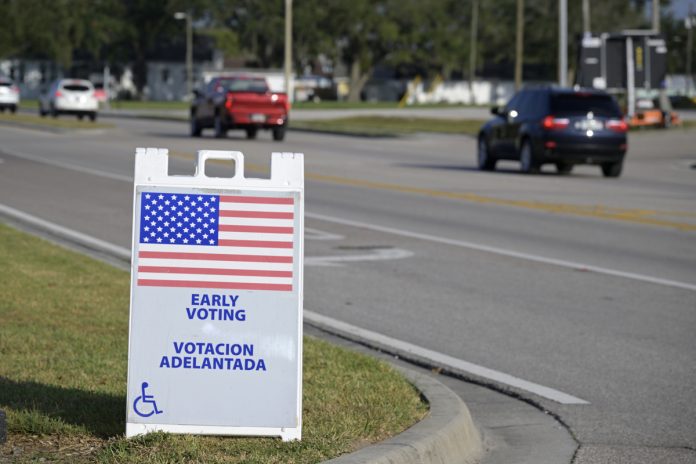
A sign is viewed outside an early voting location for the general election at a branch of the Orange County Public Library, Thursday, Nov. 3, 2022, in Winter Garden, Fla. (Phelan M. Ebenhack via AP)
A federal judge once spent nearly 300 pages overturning portions of a Florida law that he said intentionally aimed to restrict Black people from voting. Now, in a recent opinion, he spent fewer than 20 pages backtracking on the earlier ruling — after his opinion was reversed on appeal.
But the judge did not back away from mentioning the Sunshine State’s history and legacy of, and ongoing commitment to, anti-Black voting laws.
“As this Court previously found after a lengthy, two-week bench trial, the State of Florida has, with surgical precision, repeatedly changed Florida’s Election Code to target whichever modality of voting Florida’s Black voters were using at the time,” Tallahassee-based U.S. District Judge Mark Walker wrote earlier this month. “That was not this Court’s opinion — it is a fact established by the record in these cases. Even so, following the State of Florida’s appeal, this persistent and pernicious practice of targeting the modalities of voting most used by Florida’s Black voters has apparently received the stamp of approval in this Circuit.”
In May 2021, Gov. Ron DeSantis signed the disputed legislation, known as SB 90, into law. The omnibus act ratchets up voter ID requirements, prohibits mass mailing and collection of ballots, and decreases drop-box availability. Two class action lawsuits targeting the law — the first by voting rights organizations and the second by racial justice organizations — were filed in federal court that same month.
Two additional lawsuits were also filed and all four cases were ultimately consolidated together to challenge the restrictive voting law.
In March 2022, in a 288-page opinion, Walker wrote that thousands of pages of evidence and testimony during the bench trial supported the conclusion that SB 90 was passed by Republicans to diminish Democratic turnout — by targeting Black voters, who are outpaced by white voters “in almost every socioeconomic metric.”
“For the past 20 years, the majority in the Florida Legislature has attacked the voting rights of its Black constituents,” the judge noted.
In May 2022, a three-judge panel on the U.S. Court of Appeals for the 11th Circuit unanimously stayed the initial injunction that Walker had placed on SB 90 by finding that he acted too closely to the time of the then-upcoming midterm election. The merits were left for later. Nearly a year later, in April 2023, in a 2-1 decision, a different three-judge panel overruled the trial court on the merits and ordered a remand.
On remand, in a 17-page final order, Walker begrudgingly accepted that he was being forced to change course “based on the Eleventh Circuit’s reweighing of the facts” while protesting the appellate court’s break from tradition in the body of his opinion and in a lengthy footnote.
“[H]ere, this Court is faced with a blend of legal conclusions and new ‘factual findings,’ and it is unclear how this blended appellate ruling binds this Court going forward,” Walker writes. “This is particularly true when the new ‘factual findings’ at issue implicate the State’s justifications for passing the challenged provisions and this Court must now apply a different legal standard than what the Eleventh Circuit reviewed on appeal.”
Typically, reviewing courts do not touch a trial court’s factual record unless there is a “clear error,” the order notes. And then, the ordinary remedy is to point out the errors and then ask the trial court to perform new fact-finding — consult additional evidence — on the erroneous facts.
“In this case, the Eleventh Circuit was not so precise,” Walker complains. “Moreover, the court engaged in its own fact finding rather than remand with directions for further fact finding at the trial level.”
But, the judge admits, because of what the higher court did, the factual record now more or less mirrors Florida’s stated justification for limiting the availability of after-hours voting drop-boxes. On that particular fact, Walker concedes: “There is still some evidence of fraud — as remote as it may be.”
“[T]his Court is not discounting the fact that in some cases, there may in fact be evidence of fraud or legitimate concerns about fraud connected with a given modality of voting,” the order reads. “But here, notwithstanding this Court’s own fact finding after a two-week bench trial, the Eleventh Circuit found that voter fraud, including vote-by-mail fraud, “’has plagued Florida elections in the past,’ such that preventing this ‘plague’ constituted a legitimate motivation giving rise to the passage of SB 90.”
And, in the end, while certainly an inconvenience, limiting drop-boxes does “make it harder” to vote but “the restrictions at issue do not keep people from voting.” Walker’s order explains.
“[T]he burden here is relatively modest — something more than an incidental burden for those who depend upon more flexible hours to submit their ballots, without constituting a substantial burden on the right to vote,” the judge concludes. “Accordingly, Plaintiffs have not met their burden to establish that the drop-box restrictions unduly burden their First and Fourteenth Amendment rights.”
The order also revives “tighter deadlines and processing requirements” on third-party voting registration organizations. Those laws, both the circuit and district court ruled, have a disparate impact on Black voters. The appellate court, however, found that those restrictions were not racist on their face.
Have a tip we should know? [email protected]

